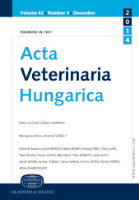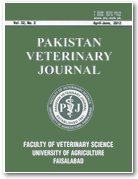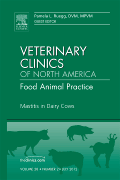
Iranian Journal of Veterinary Research
Scope & Guideline
Elevating Animal Health Through Innovative Research
Introduction
Aims and Scopes
- Veterinary Pathology and Disease Diagnosis:
Research focusing on the diagnosis and pathology of diseases affecting various animal species, including the molecular characterization of pathogens and epidemiological studies. - Reproductive Health and Breeding Management:
Studies aimed at improving reproductive performance in livestock through advanced techniques like estrus synchronization, semen cryopreservation, and reproductive health evaluations. - Pharmacology and Therapeutics in Veterinary Medicine:
Research on the therapeutic potential of various compounds, including the effects of medications, anesthetics, and alternative therapies on animal health. - Microbiology and Infectious Diseases:
Investigations into microbial infections in animals, including studies on antibiotic resistance, virulence factors, and the impact of pathogens on animal and public health. - Nutritional Science and Animal Performance:
Research examining the effects of dietary components on animal growth, health, and production, including the use of probiotics, prebiotics, and dietary additives. - Animal Welfare and Behavior Studies:
Research that explores the welfare and behavioral aspects of domestic and exotic animals, focusing on improving husbandry practices.
Trending and Emerging
- Antimicrobial Resistance and Public Health:
Research addressing antimicrobial resistance in veterinary pathogens is on the rise, reflecting global concerns over drug resistance and its implications for animal and human health. - Stem Cell Therapy and Regenerative Medicine:
There is an increasing interest in the application of stem cell therapy for regenerative purposes in veterinary medicine, particularly concerning joint and tissue repair. - Innovative Reproductive Technologies:
Emerging technologies in reproductive health, including advanced estrus synchronization protocols and cryopreservation techniques, are gaining attention for their potential to enhance livestock production. - Molecular Epidemiology of Infectious Diseases:
Research utilizing molecular techniques to track and characterize infectious diseases in animal populations is growing, emphasizing the need for molecular insights in disease management. - Nutritional Biochemistry and Animal Health:
A growing number of studies focus on the biochemical effects of dietary supplements and additives on animal health and productivity, indicating an increasing recognition of nutrition's role in veterinary practice.
Declining or Waning
- Traditional Veterinary Practices:
Research centered on conventional veterinary practices and treatments has been less frequently published, possibly due to a shift towards more innovative and evidence-based approaches in veterinary medicine. - Zoological Studies on Wildlife:
There has been a reduction in studies focusing exclusively on wildlife and exotic animal species, indicating a potential shift towards domestic animal research and issues pertinent to livestock. - Basic Morphological Studies:
Papers that solely focus on the morphological aspects of animals without a functional or applied perspective have decreased, suggesting a move towards more integrative and applied research that combines morphology with other scientific disciplines.
Similar Journals

BMC Veterinary Research
Elevating the discourse on animal health and welfare.BMC Veterinary Research, published by BMC in the United Kingdom, stands as a pivotal open-access platform dedicated to advancing the field of veterinary science since its inception in 2005. With an impressive impact factor that reflects its influential presence, this journal has achieved a remarkable ranking of #17 out of 194 in the Scopus Veterinary category, placing it in the 91st percentile among its peers. The journal serves as an essential resource for researchers, professionals, and students alike, fostering the dissemination of high-quality research and innovative practices within the veterinary and broader medical communities. With its commitment to open access, BMC Veterinary Research ensures that valuable insights are accessible to all, promoting collaboration and knowledge sharing that drive the advancement of veterinary sciences. As it continues to publish significant findings until 2024, it remains a key contributor to the contemporary discourse on animal health and welfare.

ACTA VETERINARIA SCANDINAVICA
Connecting knowledge for a healthier animal world.ACTA VETERINARIA SCANDINAVICA is a prestigious open-access journal dedicated to advancing the field of veterinary science and promoting interdisciplinary research. Published by BMC since 2001, this journal has become a vital resource for veterinarians, researchers, and students worldwide, with an ISSN of 0044-605X and an E-ISSN of 1751-0147. With a remarkable impact factor reflecting its relevance—ranking in the Q2 quartile for Veterinary (miscellaneous) and Q3 for Medicine (miscellaneous)—ACTA VETERINARIA SCANDINAVICA focuses on a broad spectrum of veterinary topics, ensuring that critical research is available to the academic community and beyond. Located in the United Kingdom, this journal has successfully converged its publishing efforts from 1960 to 2024, highlighting its long-standing commitment to veterinary excellence. Researchers are encouraged to submit their work through the journal’s user-friendly platform, contributing to the ever-evolving landscape of animal health and welfare.

Ankara Universitesi Veteriner Fakultesi Dergisi
Pioneering research in veterinary sciences and animal biology.Ankara Universitesi Veteriner Fakultesi Dergisi is a prominent academic journal published by ANKARA UNIV, focusing on advancements in veterinary sciences and animal biology. Since its inception, the journal has been committed to disseminating high-quality research, featuring articles that span a variety of topics within veterinary medicine and animal science. With an ISSN of 1300-0861 and an E-ISSN of 1308-2817, this journal provides valuable insights into the latest research developments and trends, making it a critical resource for researchers, professionals, and students in the field. The journal has established itself within the scholarly community, achieving a Q3 rank in Animal Science and Zoology and a Q2 rank in Veterinary (miscellaneous) as of 2023, reflecting its growing relevance and impact. Positioned in Turkey, it serves as a vital platform for both local and international scholars to share innovative findings and foster collaboration. Enhancing its accessibility, the journal's content is available through various academic databases, ensuring that its readership can effortlessly access and engage with cutting-edge research.

BERLINER UND MUNCHENER TIERARZTLICHE WOCHENSCHRIFT
Your Gateway to Veterinary Insights and ResearchBERLINER UND MUNCHENER TIERARZTLICHE WOCHENSCHRIFT is an esteemed journal in the fields of Veterinary Science and Medicine, published by SCHLUETERSCHE VERLAGSGESELLSCHAFT MBH & CO KG. Since its inception in 1946, this journal has served as a vital platform for advancing knowledge and research in veterinary medicine within Germany and beyond. With a current impact factor that places it in the Q4 category in both Medicine and Veterinary, it continues to provide significant insights for professionals, researchers, and students engaged in the veterinary community. Although it is not an Open Access journal, its rich content contributes to the foundational literature of the field, making it an essential reference. Researchers looking to publish their findings or keep informed on the latest advancements in veterinary and medical practices will find this journal an invaluable resource. It is headquartered in Hannover, Germany, and serves as a testament to the ongoing dedication to veterinary research since the mid-20th century.

ACTA VETERINARIA HUNGARICA
Empowering the future of veterinary science through scholarship.ACTA VETERINARIA HUNGARICA is a prestigious academic journal published by AKADEMIAI KIADO ZRT, dedicated to the diverse field of veterinary science. With a history spanning over three decades since its inception in 1983, this journal provides a platform for the dissemination of high-quality research, clinical studies, and reviews that contribute to advancing knowledge in veterinary medicine and animal health. Based in Hungary, it has built a respectable reputation, reflected in its Scopus ranking, where it occupies the 84th position out of 194 in the General Veterinary category, placing it within the 56th percentile. Although the journal is not open access, it continues to attract a global audience of researchers, professionals, and students who are keen on exploring advancements in veterinary science as it converges towards its upcoming year of 2024. Readers will find valuable insights that foster innovation and improve animal care practices across various settings, making ACTA VETERINARIA HUNGARICA an essential resource for anyone involved in the veterinary field.

PAKISTAN VETERINARY JOURNAL
Championing excellence in veterinary research since 2009.Pakistan Veterinary Journal (ISSN: 0253-8318, E-ISSN: 2074-7764) is a leading peer-reviewed academic journal published by the University of Agriculture, Faculty of Veterinary Science, situated in Faisalabad, Pakistan. Since its inception, the journal has embraced an Open Access policy, facilitating the dissemination of vital research findings to a global audience and enhancing the visibility of veterinary science. With an impressive Q1 ranking in the veterinary miscellaneous category, the journal ranks #27 out of 194 in the veterinary general field according to Scopus, placing it in the top 14% of the discipline. The scope of the journal encompasses a wide array of topics relevant to veterinary medicine, ensuring that it serves as an essential resource for researchers, professionals, and students alike. By providing a platform for high-quality research from 2009 to 2024, the Pakistan Veterinary Journal continues to play a pivotal role in advancing veterinary science, promoting collaboration among scholars, and addressing contemporary challenges in animal health and welfare.

Large Animal Review
Transforming knowledge into action for large animal health.Large Animal Review is a prestigious academic journal dedicated to advancing the field of veterinary science, particularly focusing on the health and management of large animals. Published by the SIVAR-SOC ITALIANA VETERINARI ANIMALI REDDITO, this journal is an invaluable resource for researchers, practitioners, and students eager to explore innovative methodologies, research findings, and case studies related to veterinary medicine for larger species. With a commitment to quality, Large Animal Review holds a Q3 categorization in the Veterinary (miscellaneous) sector according to the 2023 metrics, indicative of its growing influence within the academic community. The journal benefits from an international readership and is dedicated to fostering interdisciplinary collaborations, making it an essential addition to any professional's library. The journal is accessible through various platforms, ensuring wide distribution of its valuable content, as it strives to enhance the understanding and welfare of large animals across diverse settings.

Indian Journal of Animal Research
Advancing Animal Science Through Innovative ResearchIndian Journal of Animal Research is a prominent publication in the field of animal science and veterinary medicine, established to advance the understanding of animal husbandry, biology, and health. Published by the AGRICULTURAL RESEARCH COMMUNICATION CENTRE, this journal has been contributing to the scholarly discourse since 2008, with a commitment to high-quality research dissemination. With its current Q3 ranking in both Animal Science and Zoology and Veterinary (miscellaneous) categories, it serves as a crucial platform for researchers aiming to share insights and innovations within these disciplines. Although it operates without open access, it remains widely recognized, fostering a collaborative academic environment. The journal's impact is underscored by its presence within the Scopus database, providing valuable rankings in both General Veterinary and Animal Science and Zoology fields. Researchers, professionals, and students interested in veterinary advancements and animal research will find this journal a valuable resource for the latest scientific findings and discussions. Join the community of scholars igniting progress in the vital realm of animal research.

Open Veterinary Journal
Advancing Veterinary Science Through Open AccessOpen Veterinary Journal, published by the University of Tripoli, Faculty of Veterinary Medicine, offers a vital platform for the dissemination of research in the field of veterinary sciences. With an ISSN of 2226-4485 and an E-ISSN of 2218-6050, this journal has been committed to open access since 2011, allowing for unfettered access to its content, which ensures that researchers, practitioners, and students worldwide can benefit from the latest veterinary research findings. Operating from Libya, it has garnered an important position within the academic community, achieving a Q2 quartile ranking in the scope of veterinary (miscellaneous) and maintaining a Scopus rank of 104 out of 194 within the general veterinary category, indicating its growing influence and reach. The journal focuses on a diverse array of topics pertinent to contemporary veterinary practice, aiming to bridge gaps in knowledge and foster collaboration among scholars and practitioners. As it continues to publish original research and reviews, Open Veterinary Journal stands as a crucial resource for advancing veterinary medicine, supporting innovative research, and enhancing educational outcomes within the profession.

VETERINARY CLINICS OF NORTH AMERICA-FOOD ANIMAL PRACTICE
Championing Quality in Food Animal Veterinary MedicineVETERINARY CLINICS OF NORTH AMERICA-FOOD ANIMAL PRACTICE is a premier peer-reviewed journal dedicated to advancing knowledge in the field of food animal veterinary medicine. Published by W B SAUNDERS CO-ELSEVIER INC, this journal serves as a vital resource for veterinarians, researchers, and students, facilitating the dissemination of high-quality, impactful research and reviews. With an impressive Q1 ranking in both the fields of Food Animals and Medicine, and a notable Scopus rank of 2 out of 39 in Veterinary Food Animals, the journal plays a critical role in addressing the complexities and advancements in food animal health. Although it is not an Open Access journal, subscribers have access to a wealth of articles that are pivotal to the profession. Founded in 1971, the journal continues to provide cutting-edge insights and support for effective practices in veterinary medicine through 2024 and beyond. Its commitment to excellence and relevance ensures it remains an indispensable source for the latest developments in the veterinary field.